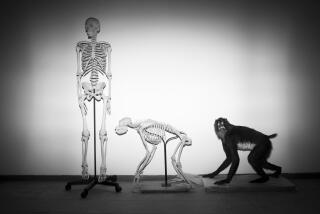Jaws Flapping Over Evolutionary Theory
- Share via
Touching off a scientific furor, researchers say they may have discovered the mutation that caused the earliest humans to branch off from their apelike ancestors: a gene that led to smaller, weaker jaws and, ultimately, bigger brains.
Smaller jaws would have fundamentally changed the structure of the skull, they contend, by eliminating thick muscles that worked like bungee cords to anchor a huge jaw to the crown of the head. The change would have allowed the cranium to grow larger and led to the development of a bigger brain capable of tool-making and language.
The mutation is reported in the latest issue of the journal Nature, not by anthropologists, but by a team of biologists and plastic surgeons at the University of Pennsylvania and the Children’s Hospital of Philadelphia.
The report provoked strong reactions throughout the hotly contested field of human origins, with one scientist declaring it “counter to the fundamentals of evolution” and another pronouncing it “super.”
The Pennsylvania researchers said their estimate of when this mutation first occurred -- about 2.4 million years ago, in the grasslands of East Africa, the accepted cradle of humanity -- generally overlaps with the first fossils of prehistoric humans featuring rounder skulls, flatter faces, smaller teeth and weaker jaws.
And the remarkable genetic mutation persists to this day in every person, they said.
Nonhuman primates -- including Homo sapiens’ closest animal relative, the chimpanzee -- still carry the original big-jaw gene and the apparatus enabling them to bite and grind the toughest foods.
University of Michigan biological anthropologist Milford Wolpoff called the research “just super.”
“The other thing that was happening 2 1/4 million years ago is that people were beginning to make tools, which enabled them to prepare food outside their mouths,” he said. “This is a confluence of genetic and fossil evidence.”
Other researchers strenuously disagreed that human evolution could literally hinge on a single mutation affecting jaw muscles, and that once those muscles were reduced, the brain suddenly could grow unfettered.
“Such a claim is counter to the fundamentals of evolution,” said C. Owen Lovejoy of Kent State University. “These kinds of mutations probably are of little consequence.”
Jaws have been a focus of evolutionary research since Charles Darwin, and the mutation offers a tantalizing theory. But it is unlikely that one mutation -- even at a crucial evolutionary juncture -- would make a person, some skeptics said.






